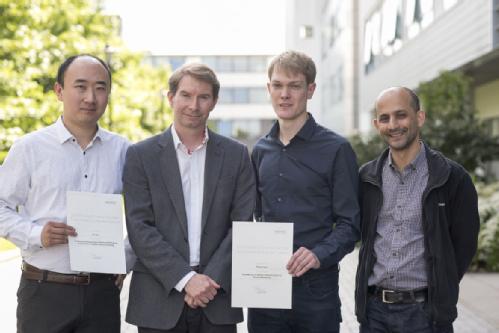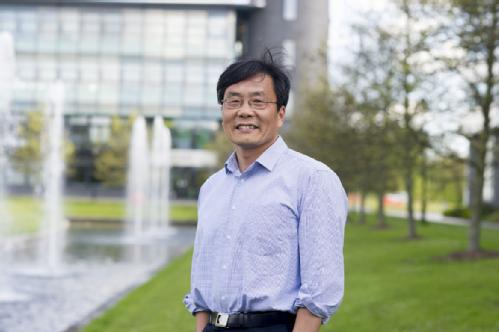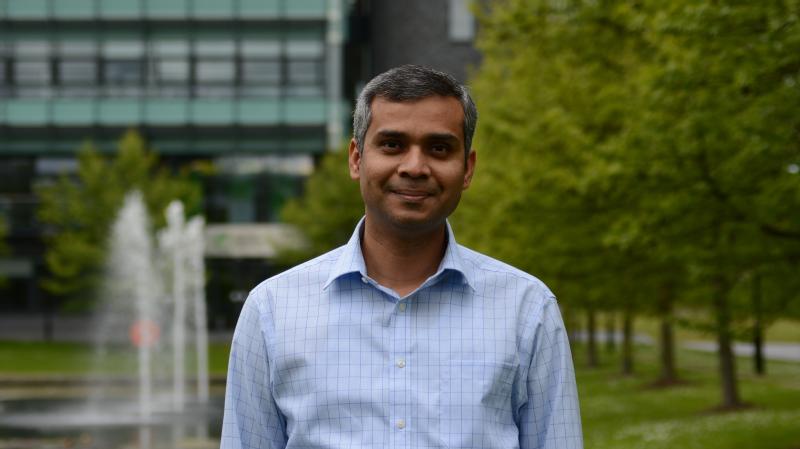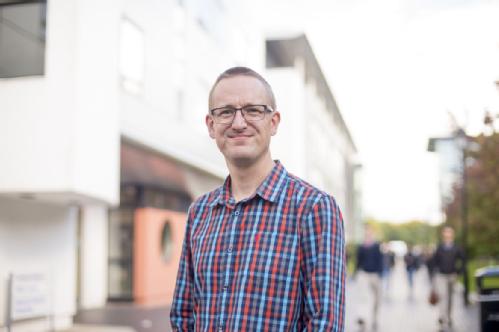Computer Science News
Graham Cormode awarded 2017 Adams Prize
Professor Graham Cormode has been awarded the 2017 Adams Prize by the Cambridge Faculty of Mathematics. The award recognizes his work on "Statistical Analysis of Big Data", and is awarded jointly with Professor Richard Samworth of Cambridge. Professor Cormode says,
My work, in common with Prof Samworth's, is about finding mathematical representations of data that allow useful information to be extracted effectively and accurately. These techniques allow ever larger quantities of data to be handled on ordinary computers.
Professor Cormode's work on "data sketches" has been used in companies such as Netflix, Yahoo, Twitter, Google, AT&T and Sprint. He is currently leading Warwick's involvement in the Alan Turing Institute at London, and working on questions to do with verification of machine learning, and privacy.
Sylvain Schmitz visits as IAS Residential Fellow
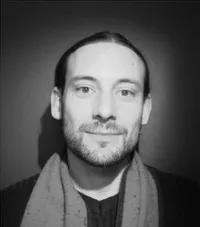 As a Residential Fellow of Warwick's Institute of Advanced Study, Dr Sylvain Schmitz is visiting the department 20-24 March 2017, for collaborative research with Dr Ranko Lazic and other members of DIMAP.
As a Residential Fellow of Warwick's Institute of Advanced Study, Dr Sylvain Schmitz is visiting the department 20-24 March 2017, for collaborative research with Dr Ranko Lazic and other members of DIMAP.
Schmitz (PhD University of Nice - Sophia Antipolis 2007) is an Assistant Professor at ENS Paris-Saclay and a permanent member of LSV, one of the top European research centres in logical aspects of computer science. In 2015, Schmitz was a Leverhulme Visiting Professor at Warwick. An author of over 40 articles in international journals and conferences, Schmitz's work has attracted over 500 citations, won best-paper awards, and been presented at several invited talks and European doctoral schools.
New collaborative project on parity games
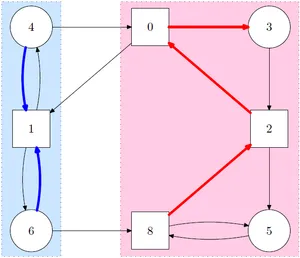
Dr Marcin Jurdzinski and Dr Ranko Lazic from Warwick's DIMAP inter-disciplinary centre and the Computer Science department, jointly with Dr Sven Schewe, Dr John Fearnley and Dr Dominik Wojtczak from the University of Liverpool, will lead a new research project on solving parity games in theory and practice, to run 2017-2020.
The project will be supported by approx. £750K from the EPSRC across the two sites. The proposal was ranked top at its funding prioritisation panel, and the reviewers said:
This is the strongest and best designed proposal on theoretical computer science I have seen in the last five years.
as well as
The proposal is about fundamental research, but there is a clear path connecting the expected results to concrete industrial needs on program verification and program synthesis.
Professor Artur Czumaj, head of DIMAP and of the Theory and Foundations research division, commented:
This exciting new EPSRC project builds on excellence in theoretical computer science for which Warwick is internationally renowned. It strengthens our collaborative links with Computer Science at Liverpool, who were likewise one of the leading departments for research outputs in the most recent REF.
Computer Science gains two Doctoral Thesis Prizes
The Department of Computer Science celebrates two Faculty of Science Doctoral Thesis Prizes this year.
Dr Bo Gao’s research on energy-aware workload offloading for mobile environments investigates power-compute trade-offs for mobile and cloud computing platforms. This work has gained recognition from researchers in India, China, Malaysia, Italy, Australia, Pakistan, Germany, Canada and France, and has been cited by the US Army Research Laboratory.
Dr Philip Taylor’s research, in collaboration with Jaguar Land Rover, investigates data mining of vehicle telemetry data for driver monitoring, which is contributing to Warwick’s work with JLR on delivering safe and efficient autonomous and semi-autonomous cars of the future.
Congratulations to both candidates on their outstanding research.
Can brain scans lead to better AI?
Pioneering work by Professor Jianfeng Feng, which has recently featured in the national press, uses MRI scans to understand how the brain works and could be used to create better AI (Artificial Intelligence) systems in the future. Professor Jianfeng has discovered that the more variable a brain is, and the more its different parts frequently connect with each other, the higher a person's IQ and creativity are.
Professor Jianfeng Feng, from the Computer Science Department at Warwick, comments that
Human intelligence is a widely and hotly debated topic and only recently have advanced brain imaging techniques, such as those used in our current study, given us the opportunity to gain sufficient insights to resolve this and inform developments in artificial intelligence, as well as help establish the basis for understanding the diagnosis of debilitating human mental disorders such as schizophrenia and depression
Full Story:
University contributing to new advances in cancer diagnosis
A University of Warwick computer scientist is working with technology that could revolutionise how some cancers are diagnosed.
A high-tech computer system is able to read samples of human tissue and aid pathologists in the identification of minute changes in cells that can indicate cancer is present. More than 10,000 slides were examined in the first phase of the study[1] which shows that pathologists are as good at accurately diagnosing cancer on a computer as they are with a microscope.
Now Professor Nasir Rajpoot is working with University Hospitals Coventry and Warwickshire NHS Trust (UHCW) to develop the next generation of image analytics to use with this technology.
The ground breaking technology has the power to help pathologists grade some types of tumours, including lung, prostate and bladder tumours with precision. In prostate cancer, for example, this could make the difference between someone being offered surgery rather than drug based treatments.
The computer system known as The Omnyx® Precision Solution™, can help pathologists to see the small differences in cells in the same way that they have currently been using a microscope, allowing them to make sound decisions on many aspects of cancer diagnosis.
UHCW is the first in the UK to introduce this kind of innovation to its routine practice, meaning it is already benefitting patients.
The Omnyx system digitises slides which are traditionally placed on a microscope so that pathologists can look at them on a computer. Once on the computer, the UHCW scientists have written programmes which will separate normal from abnormal samples.
Consultant pathologist David Snead said:
“I am delighted that University Hospital, Coventry has led this ground breaking study. This provides even greater evidence that digital pathology really works, and works well. The introduction of digital pathology has fantastic potential benefits for patients. We can expect to be able to read samples more quickly than before, and the big advantage is that we can use the computer to easily manipulate an image or its data. For some patients, this additional information may change how their disease is managed.”
Mamar Gelaye, CEO of Omnyx noted:
“Dr Snead and his team have made a significant contribution to showing the value of digital pathology for both clinicians and patients. We are only at the beginning of harnessing the benefits of digitising pathology services, and we look forward to working with institutions like University Hospitals Coventry and Warwickshire NHS Trust to achieve even greater progress in delivering more accurate and efficient cancer diagnoses.”
Dr Rajpoot said:
“This is a very exciting development in the field of digital pathology. What it means is that we can now move forward with the application of digital pathology image analysis algorithms in a clinical setting. For instance, computer algorithms can automate the process of detecting normal samples so that some routine cases will not need to be looked at by a pathologist at all.
“Together with the team at UHCW, we are looking forward to developing technologies for computer-assisted diagnosis and image analytics for discovering biologically meaningful and clinically relevant signatures of cancer.”
Warwick to research how we prepare for autonomous vehicles
- Investigating how to manage the transition to autonomous vehicles
- Researchers to ask how machine and human intelligence can be combined
- Jaguar Land Rover and EPSRC fund £2m University of Warwick research
The problems surrounding the introduction of autonomous vehicles on public roads are to be addressed by new research led by the University of Warwick.
Despite progress in recent years the researchers argue that there are many unsolved challenges, not least related to how such cars will be accepted by the public.
Led by Dr Nathan Griffiths, a Royal Society Industry Fellow in the University of Warwick’s Department of Computer Science, who says that:
“The move to autonomous vehicles is most significant transition in motoring for a century, involving the complex tasks inherent to driving becoming increasingly performed by machine. Individual drivers and their cars will form part of wider and smarter urban transport infrastructure, and the cars of the future will need to be both intelligent and cooperative”.
Dr Griffiths and his co-researchers will investigate:
- How to combine machine and human intelligence to optimise driving
- How to manage the traffic environment through the use of big data
- How to coordinate and control autonomous vehicles on public roads
The opportunities to deliver better safety, traffic efficiency, and more productive and pleasant journeys are enormous, but an automotive revolution on this scale faces great challenges for science and society, argue the Warwick researchers.
There has been little prior research on how autonomous vehicles will fit in with today's manually driven cars, how drivers and occupants will interact with them and how they will run safely in our towns, with pedestrians and cyclists.
The research project began following the launch of strategic partnership between Jaguar Land Rover and the EPSRC, who issued a joint call for research proposals that focussed on developing fully autonomous cars: Towards Autonomy - Smart and Connected Control. Dr Griffiths’ project is one of five selected and Jaguar Land Rover will be leading the collaboration with these successful research groups.

